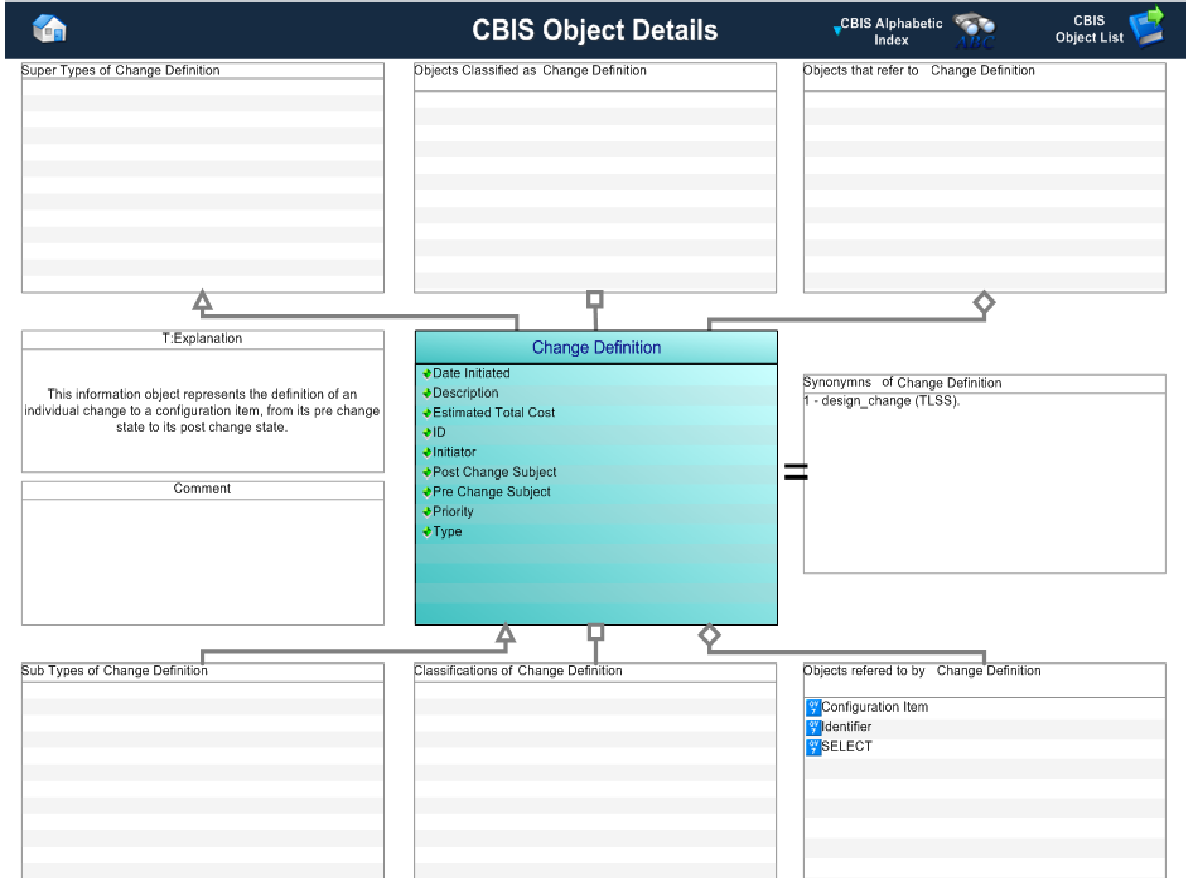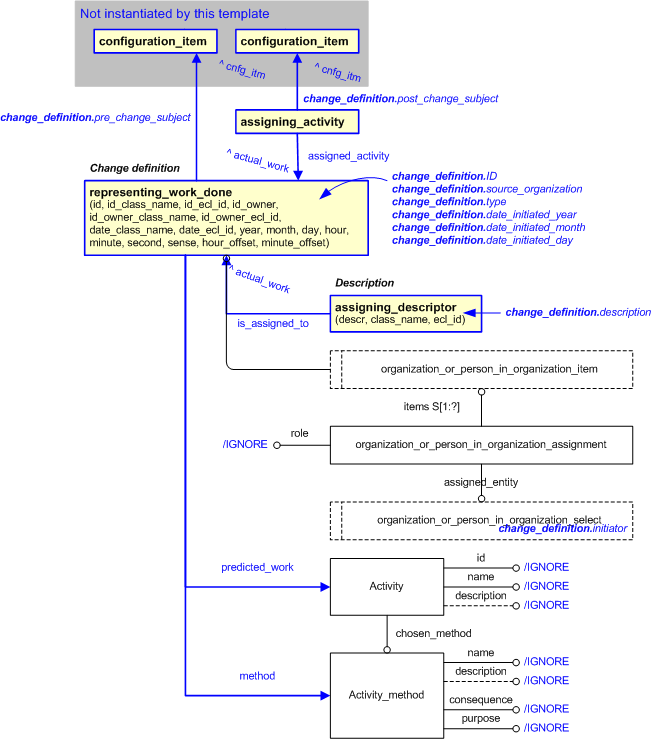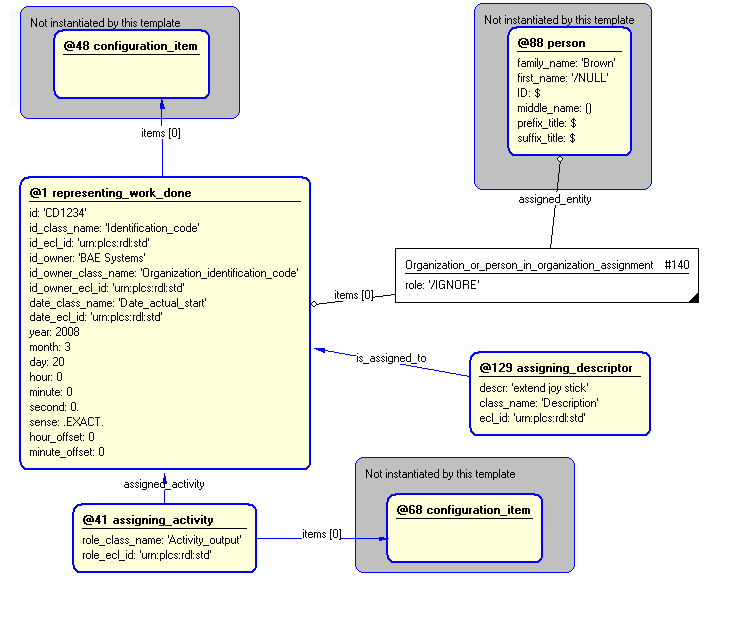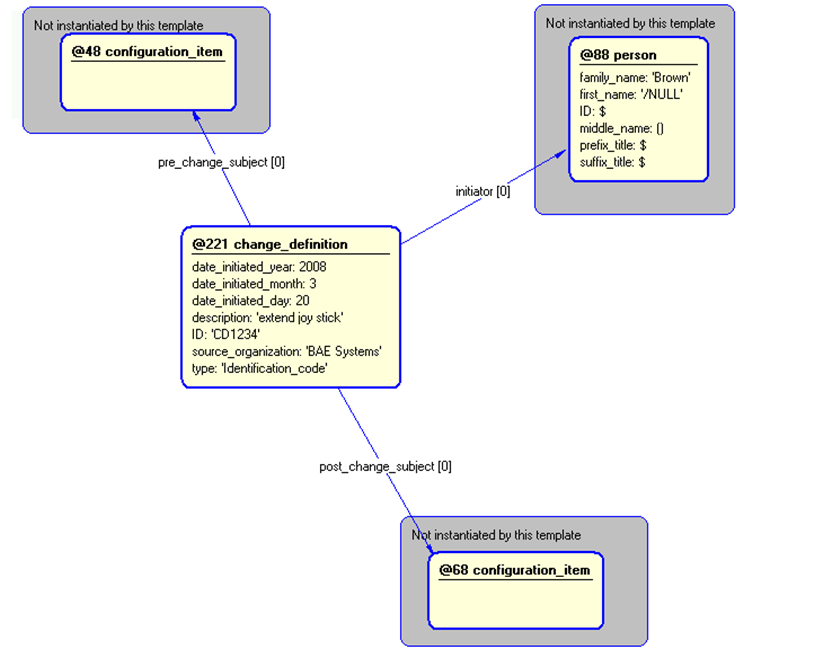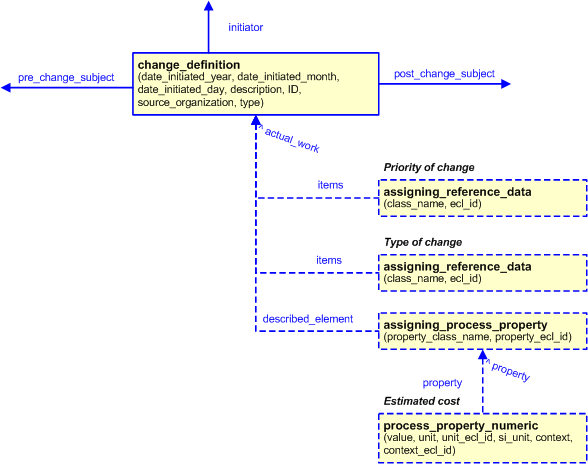Template:— change_definition (chg_dfn)
Context:— UK_Defence |
Date: 2009/04/17 10:27:56
Revision: 1.2
|
This section specifies the template change_definition.
NOTE
The template has been defined in the context of
UK_Defence.
Refer to the business context for details of related templates.
NOTE
An explanation of a template and the associated instantiation path is
provided in the
Template overview
section.
This template describes how to represent a UK_Defence change definition, using
Activity_actual.
This information object represents the definition of an individual change to a configuration item, from its pre change
state to its post change state
For further information about the representation of a change definition, see below.
This information object represents the current information available to manage the configuration.
Figure 1 — Graphical Representation for Business Object Change Definition
This information object represents the definition of a change to the product.
|
Attribute name
|
Attribute description
|
Attribute type
|
Optionality
|
| Date Initiated |
This is the date on which the Change was initiated |
Intrinsic |
Mandatory |
| Description |
This is the description of the Change.
NOTE: Further details about the change may be detailed via Document Associations.
|
Intrinsic |
Mandatory |
| Estimated Total Cost |
This is the estimated total cost of the Change.
NOTE: The actual total cost of a Change is derivable from all the
activity resource costs related to all the activities that have been performed
to embody the Change
|
Intrinsic |
Optional |
| ID |
This is the Identifier of the change. |
Identifier |
Mandatory |
| Initiator |
This is the reference to the Person or Organization that initiated the Change. |
SELECT |
Mandatory |
| Post Change Subject |
This is the reference to the subject of the change after the change is applied. |
Configuration Item |
Mandatory |
| Pre Change Subject |
This is the reference to the subject of the change before the change is applied. |
Configuration Item |
Mandatory |
| Priority |
This is the priority that the initiator has assigned to the Change |
Intrinsic |
Optional |
| Type |
This is the categorization of the Change |
Intrinsic |
Optional |
Table 1 — Change Definition attribute details
The EXPRESS-G diagram in
Figure
2
shows the templates and EXPRESS entities that are required
to represent the template
"change_definition".
The text highlighted in blue shows the template parameters.
Figure 2 — An EXPRESS-G representation of the Information model for change_definition
The graphic for the template to be used in other EXPRESS-G diagrams
is shown in Figure
3
below.
Figure 3 — The graphical representation of the change_definition template
The following input parameters are defined for this template:
Year_component of the date on which the Change was initiated
Month_component of the date on which the Change was initiated
Day_component of the date on which the Change was initiated
The description of the change.
The identifier of the product.
The organization that created the associated identifier. Additionally
a Person or Information System could be defined when either of these are the source; see identifier characterizations
This is the name of the type of the class used to classify the identifier and so
provide the role or reason for the identification.
The following classes and their sub-classes can be used:
The reference to the Person or Organization that initiated the Change.
The reference to the subject of the change after the change is applied.
The reference to the subject of the change before the change is applied.
The following reference parameters are defined for this template:
Allow the
Activity_actual
entity instantiated in this path to be referenced when this template is used.
%^target = $change_definition.actual_work%
Allows referencing of entity Activity_actual from outside the template, e.g. in
order to characterize the Activity_actual further.
The following parameter combinations specify a uniqueness constraint:
Unique constraint: Unique id
Each instance of the
entity
(
Activity_actual)
within the data set shall be uniquely identified
by the following parameters on this
template (change_definition) namely:
ID.
The
instance is
referenced by the following template parameter:
actual_work.
The instantiation path shown below specifies the entities that are to be
instantiated by the template.
A description of templates and the syntax for the instantiation path is
provided in the
Templates Help/Information section.
-- Instantiate Activity entity ActivityActivity.id = '/IGNORE'
Activity.name = '/IGNORE'
Activity.description = '/IGNORE'
-- Instantiate Activity_method entity Activity_methodActivity_method.name = '/IGNORE'
Activity_method.description = '/IGNORE'
Activity_method.consequence = '/IGNORE'
Activity_method.purpose = '/IGNORE'
-- Instantiate representing_work_done template /
representing_work_done(
id=@ID,
id_class_name=@type,
id_ecl_id='urn:plcs:rdl:std',
id_owner=@source_organization,
id_owner_class_name='Organization_identification_code',
id_owner_ecl_id='urn:plcs:rdl:std',
method='/IGNORE',
predicted_work=Activity,
items=@pre_change_subject,
date_class_name='Date_actual_start',
date_ecl_id='urn:plcs:rdl:std',
year=@date_initiated_year,
month=@date_initiated_month,
day=@date_initiated_day,
hour='0',
minute='0',
second='0',
sense='.EXACT.',
hour_offset='0',
minute_offset='0')/
%^actual_work = $representing_work_done.actual_work%
-- Instantiate assigning_descriptor template /
assigning_descriptor(
descr=@description,
class_name='Description',
ecl_id='urn:plcs:rdl:std',
is_assigned_to=^actual_work)/
-- Instantiate assigning_activity template /
assigning_activity(
role_class_name='Activity_output',
role_ecl_id='urn:plcs:rdl:std',
assigned_activity=^actual_work,
items=@post_change_subject)/
-- Instantiate Organization_or_person_in_organization_assignment entity Organization_or_person_in_organization_assignment-- Set the Organization_or_person_in_organization_assignment attribute role to be ignored Organization_or_person_in_organization_assignment.role = '/IGNORE'
-- Assign the Organization_or_person_in_organization_assignment to the change definition Organization_or_person_in_organization_assignment.items ->
^actual_work
-- Create the initiator parameter Organization_or_person_in_organization_assignment.assigned_entity ->
@initiator
The following entities are instantiated with attributes as specified:
The instance diagram in Figure
4
shows an example of the EXPRESS entities and templates that are instantiated by the template:
/change_definition(date_initiated_year='2008', date_initiated_month='03', date_initiated_day='20', description='extend joy stick', ID='CD1234', source_organization='BAE Systems', type='Identification_code', initiator='@88', post_change_subject='@68', pre_change_subject='@48')/
(an illustration of the consolidated change_definition template is shown in
Figure
5 below.)
Figure 4 — Entities instantiated by change_definition template
The instance diagram in
Figure
5
shows the graphic symbol for the template that is to be
used in other instance diagrams. The example template is:
/change_definition(date_initiated_year='2008', date_initiated_month='03', date_initiated_day='20', description='extend joy stick', ID='CD1234', source_organization='BAE Systems', type='Identification_code', initiator='@88', post_change_subject='@68', pre_change_subject='@48')/
Figure 5 — Instantiation of change_definition template
The following section details how the
change_definition
template can be optionally characterized by assigning
other constructs to it. These are characterizations commonly
applied to the template. The ISO 10303-239 EXPRESS model may enable
other assignments to the entities instantiated by the template.
The EXPRESS-G diagram in Figure
6
shows the possible characterizations of the template
"change_definition".
Figure 6 — Characterizations for change_definition
The following characterizations may apply:
Characterization Type of change
NOTE this characterization is optional.
The type of change is provided using instances of the template
assigning_reference_data.
These are applied to the ^actual_work reference parameter.
/assigning_reference_data(class_name='Type', ecl_id='urn:plcs:rdl:uk_defence', items='@221')/
Characterization Priority of change
NOTE this characterization is optional.
The priority of change is provided using instances of the template
assigning_reference_data.
These are applied to the ^actual_work reference parameter.
/assigning_reference_data(class_name='Priority', ecl_id='urn:plcs:rdl:uk_defence', items='@221')/
Characterization Assigning properties
NOTE this characterization is optional.
Properties, e.g. estimated cost, can be assigned to a typical activity.
A property is represented using templates
assigning_process_property
and process_property_numeric.
NOTE
The assignment of process properties are described further in capability C077: assigning_process_properties.
/assigning_process_property(property_class_name='Estimated_cost', property_ecl_id='urn:plcs:rdl:uk_defence', described_element='@221')/
/process_property_numeric(value='750', unit='Pound_sterling', unit_ecl_id='urn:plcs:rdl:uk_defence', si_unit='false', context='Numerical_representation_context', context_ecl_id='urn:plcs:rdl:uk_defence', property='@10')/
NOTE
Presuming that the example of template assigning_process_property is given the value @10.
